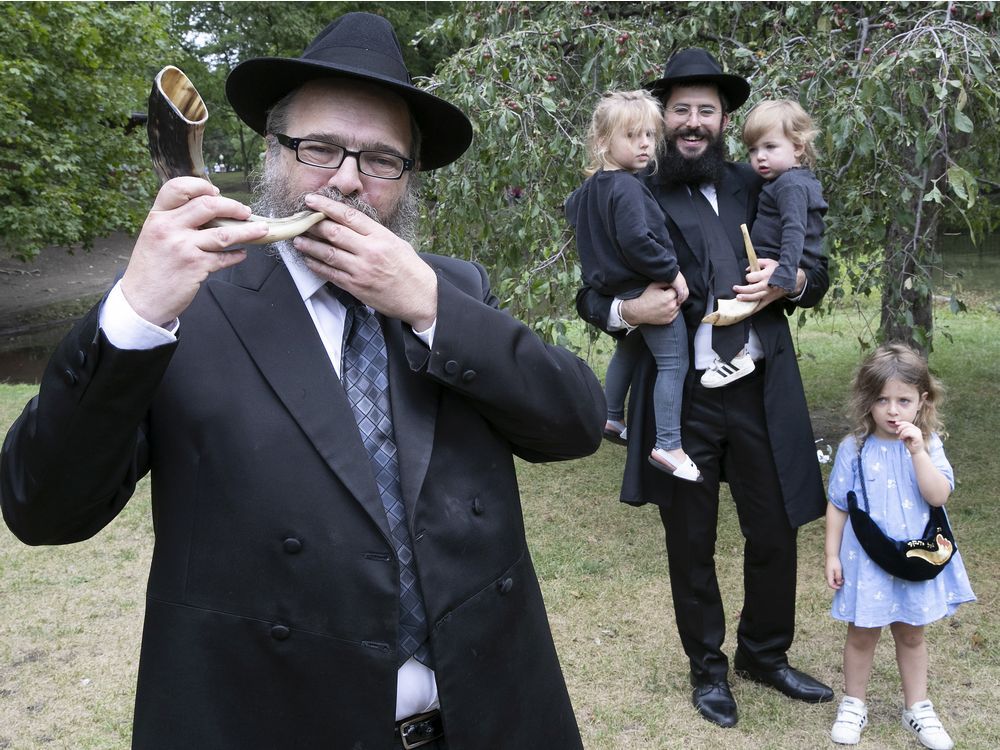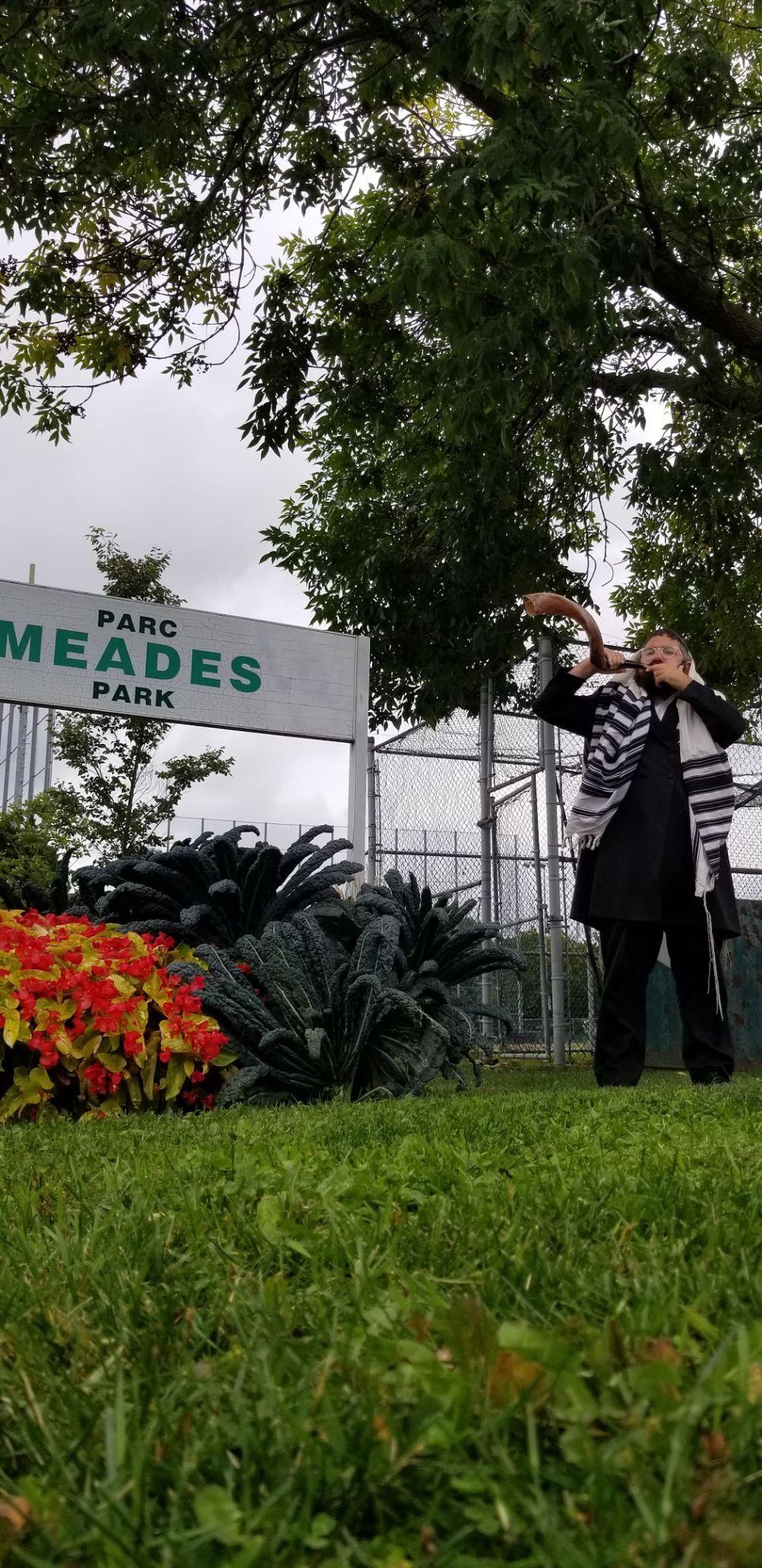In The News
By Susan Schwartz Montreal Gazette
Sep 07, 2021
Rosh Hashanah: The sound of the shofar is a call to attention and reflection
Through Shofar Montreal, people in more than 120 outdoor locations in and around the city will be able to hear the shofar sounded on Tuesday and Wednesday.
Listening to the plaintive wail of the shofar, a hollowed-out ram’s horn, sounded throughout synagogue services for Rosh Hashanah is for many Jews the very soul of the holiday: a wake-up call, a call to attention and reflection.
The two-day festival, which this year began Monday at sundown, marks the start of a new year in the Jewish calendar and the onset of the Days of Awe, a 10-day period of soul-searching and penitence culminating in Yom Kippur, the Day of Atonement. In normal times, synagogues are bursting at the seams on Rosh Hashanah and Yom Kippur.

Last year the pandemic kept most worshippers at home, and its presence continues to be felt — with limits on numbers of worshippers, mandatory masking, social distancing, required proof of vaccination and, in some synagogues, a hybrid of live-streaming and in-person services.
Some Montreal synagogues are offering outdoor shofar blowing to all — even those not attending services. “If you can’t come to the shofar, the shofar will come to you,” said Reverend Hazan Daniel Benlolo, cantor of the Spanish and Portuguese Synagogue.
And through Shofar Montreal, people in more than 120 outdoor locations in and around the city will be able to hear the shofar sounded on Tuesday and Wednesday. To listen to the sound of the shofar on Rosh Hashanah is a mitzvah, a religious duty. Shofar Montreal is an initiative of Chabad Lubavitch, a Hasidic sect and one of the world’s largest Jewish organizations.
“This is something we have been doing for several years, to bring holiness to people on a very personal level,” said Rabbi Ariel Stern, outreach director with Chabad of Westmount. The pandemic made the practice even more popular. “Suddenly, the concept applied to everyone. We were answering a need, providing a service to the community.”
Last year was “20 times busier than previous years.” In some locations, such as Murray Hill Park in Westmount and the space in front of the 5 Saisons grocery store on Greene Ave., as many as 300 people gathered on the two days to hear the shofar, Stern said.
“We put a strong focus on blowing the shofar in central locations,” he said.
The Shofar Montreal initiative is a way “to bring Judaism to the homes and the streets for people to experience it in a very natural, organic way,” Stern said.
>This year’s locations include parks, mainly, and areas outside seniors’ residences and apartment buildings, the Summit Circle lookout in Westmount, the sculpture in front of the McGill University Health Centre’s Glen site, the Jewish General Hospital, the plaza of Westmount Square and the 5 Saisons on Greene.
About 30 locations are in Westmount, with close to 100 in communities including Côte-St-Luc, Hampstead, Notre-Dame-de-Grâce, Snowdon,, Côte-des-Neiges, Town of Mount Royal, Outremont, St-Laurent, Laval, Mile End, Griffintown, the West Island, St-Lazare and the Laurentians.
“Rosh Hashanah celebrates the creation of the universe,” explained Rabbi Yossi Shanowitz, executive director of Chabad of Westmount. “The sound of the shofar awakens the heart and soul to return and connect with God.
“It is a simple voice, like that of a baby, wanting to connect,” he said. “The more simple it is, the more depth it entails.”
There are three distinct shofar notes: a long, drawn-out sound known in Hebrew as tekiah, the three broken blows of shevarim, and a series of sharp staccato sounds known as truah — a kind of alarm clock you can’t turn off, according to one description.
The sound of the shofar is the sound of hope, Shanowitz said. It is said that the coming of the Messiah will be heralded with the sound of the shofar “and there will be harmony and the world will be flooded with goodness.”
AT A GLANCE
For a list of locations at which the shofar will be blown by Rabbi Yossi Shanowitz, Rabbi Ariel Stern and others as part of the Shofar Montreal initiative on Tuesday and Wednesday, visit >shofarmontreal.com.
sschwartz@postmedia.com

By Mike Cohen The Suburban
Sept 16, 2020
Despite COVID ShofarMontreal.com ensures that one Jewish New Year tradition remains intact
With COVID-19 making it difficult or impossible for many to attend traditional High Holiday services, Chabad of Montreal has created a database of outdoor Rosh Hashanah services, centered on the sounding of the shofar — the key observance of the holiday.
ShofarMontreal.com is a centralized listing of over 100 locations around the Greater Montreal area where the shofar will be sounded on Rosh Hashanah — Sunday, Sept. 20 — outdoors and free of charge. The site also offers the opportunity to sign up for an at-home shofar service, as hundreds of volunteers will visit people outside their homes and sound the shofar for them while maintaining distancing.

“Our goal is to make the shofar — the central mitzvah of Rosh Hashanah — accessible to everyone,” said Rabbi Leibel Fine, Director of Chabad of Dollard. “Chabad of Montreal has been bringing the shofar to Montreal’s Jews, wherever they may be, for many years. This year, the reality of COVID-19 means that there may be even more people who won’t be able to make it to synagogue, so we’ll be bringing the service to them.”
While many of the holiday observances can be easily adapted to be done at home, the shofar requires the proficiency of an individual specially trained in sounding the series of notes prescribed by the Torah. Typically, the shofar is heard during the course of High Holidays prayer services, but this year, the necessary restrictions on indoor gathering has meant that many will pray at home on their own. Recognizing the challenge that this presents, Chabad of Montreal sprang into action, creating a database of locations where those unable to make it to synagogue will be able to hear the shofar and mobilizing a team of volunteers who will visit individuals who can’t make it to the outdoor shofar services either. These locations include the over 30 Montreal Chabad centres — many of which are holding multiple shofar soundings in various neighbourhood spots — as well as many local synagogues who are opening their shofar services to the public.
“The Rebbe, Rabbi Menachem M. Schneerson, of righteous memory, considered the most influential rabbi in modern history, insisted that the observance of hearing the Shofar— the key observance of Rosh Hashanah—be made accessible to all Jews — even those not attending synagogue,” Rabbi Shmuel Cohen, Director of Chabad of Kirkland explained. “Chabad of Montreal has always prioritized making Judaism available to all. During the COVID-19 pandemic, this has taken on a whole new meaning, but our mission to serve everyone remains the same.”
As the country reels in the wake of the economic recession caused by the pandemic, and with many hurting financially, many may find the cost to attend services not affordable. Many more are simply unaffiliated with a synagogue. Chabad of Montreal is dedicated to removing entry barriers and ensuring that all who wish to participate in a meaningful celebration of the Jewish New Year may do so. By listing and providing these shofar services free of charge, Chabad of Montreal hopes to accommodate many for whom this observance would otherwise not be possible.
“According to Jewish tradition, the gates of Heaven are open on the New Year, and G-d accepts prayers from everyone,” said Rabbi Fine. “That serves as our inspiration to keep our services open and accessible as well to the entire community.”
Chabad-Lubavitch has brought shofar to the streets since 1953 when the Rebbe directed his followers to hit the streets between prayers on Rosh Hashanah and blow the shofar for those unable, for whatever reason, to attend synagogue. There was, from the beginning of this campaign, a special emphasis on visiting and blowing shofar for bedridden hospital patients, and on Rosh Hashanah, volunteers would spread out through New York City, Chicago and Miami, among other cities, enabling thousands of patients to hear the cry of the shofar. And this year, during the COVID-19 pandemic, ShofarMontreal.com will continue this mission, bringing the sound of the shofar to thousands.
Note: While the shofar is sounded every year on both days of Rosh Hashanah, this year, because the first day is Saturday, the Jewish Sabbath— Shabbat, the shofar is only sounded on Sunday Sept. 20—the second day of the holiday. Rosh Hashanah services will also take place the preceding day—Saturday Sept. 19 and the evening of Friday Sept. 18—but without the Shofar, as its use is actually prohibited on Shabbat.
